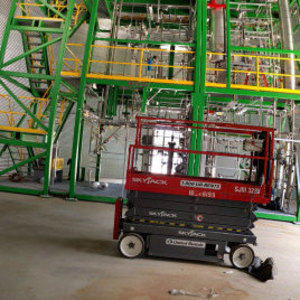Anellotech achieves key process technology operating milestone




Anellotech
April 2, 2018
BY Anellotech
Anellotech, a sustainable technology company pioneering the Bio-TCat process for production of cost-competitive renewable chemicals and fuels from non-food biomass, has announced a key operating milestone, achieving two weeks of continuous operation of its seven-story tall TCat-8 pilot plant, producing aromatics (primarily benzene, toluene, and xylenes) from loblolly pine feedstock. Anellotech also secured an additional $6 million investment from Suntory Holdings Ltd., which was part of a previously announced $15 million package. Suntory’s total investment in Anellotech’s program is now more than $30 million.
The Bio-TCat Process’s cost-competitive renewable aromatic chemicals are “drop in” replacements for their identical petroleum-derived counterparts, and can be used in manufacturing plastics such as polyester, nylon, polycarbonate, polystyrene, or for renewable transportation fuels. The low carbon footprint of Bio-TCat products can help chemical producers and consumer brand owners meet challenging corporate environmental sustainability goals.
Having recently announced completion of commissioning of the TCat-8 pilot plant located in Silsbee, Texas, Anellotech has begun an extensive development program to optimize process variables, validate process economics, confirm catalyst long-term performance, and obtain the critical data for commercial plant design. As these studies continue, TCat-8 is producing evaluation quantities of renewable aromatic chemicals for conversion into bio-based polymer prototypes and for bio-fuel certification programs.
“We have demonstrated continuous, stable operation of the TCat-8 pilot unit over a two week period as the first key step in demonstrating Bio-TCat’s commercial viability,” said Charles Sorensen, chief technology officer of Anellotech. “In a relatively short time period, our pilot plant has generated a large amount of high-quality data which gives us confidence that we will be able to achieve our longer-term operational goals. Continuous catalyst circulation, the injection of solid biomass feedstock into the reactor, and several internal recycle loops create numerous complexities that Anellotech engineers and scientists, together with our R&D partners IFPEN and Johnson Matthey, have successfully addressed.”
The alliance with Suntory, one of Anellotech’s principal strategic investment partners, began in 2012 with the goal of enabling the development and commercialization of cost-competitive 100 percent bio-based plastics for use in beverage bottles. Suntory currently uses 30 percent plant-derived materials for its Mineral Water Suntory Tennensui brands and is pursuing the development of a 100 percent biobased PET bottle through this alliance, as part of its commitment to sustainable business practices.
Anellotech continues to seek additional strategic partners to support its development and participate in the future success of Bio-TCat technology. With Suntory’s strong interest in paraxylene, Anellotech’s technology provides a unique complementary opportunity for companies interested in using bio-benzene or toluene to reduce greenhouse gas emissions associated with the manufacture of polymers and products such as ABS, nylons, polycarbonates, polyurethanes, detergents, and other aromatic-containing products currently made from petroleum.
Advertisement
Advertisement
Advertisement
Advertisement
Related Stories
The U.S. Department of Energy Bioenergy Technologies Office (BETO) announced up to $23 million in funding to support research and development (R&D) of domestic chemicals and fuels from biomass and waste resources.
The U.S. DOE has announced its intent to issue funding to support high-impact research and development (R&D) projects in two priority areas: sustainable propane and renewable chemicals and algal system cultivation and preprocessing.
Sens. Sherrod Brown, D-Ohio, and Pete Ricketts, R-Neb., in August introduced the Renewable Chemicals Act, a bill that aims to create a tax credit to support the production of biobased chemicals.
The Chemical Catalysis for Bioenergy Consortium, a consortium of the U.S. DOE’s Bioenergy Technologies Office, has launched an effort that aims to gather community input on the development of new biomass processing facilities.
USDA on March 8 celebrated the second annual National Biobased Products Day, a celebration to raise public awareness of biobased products, their benefits and their contributions to the U.S. economy and rural communities.
Upcoming Events










